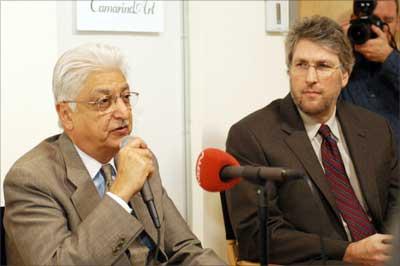|
| Help | |
| You are here: Rediff Home » India » Business » Pix |
|
|
October 26, 2006
"If you do not create jobs for people who are getting more educated -- something which is becoming an important family priority -- one could get a very large percentage of people coming off the workforce without an opportunity. That could be a source of frustration because people would be more vocal and more aggressive," Premji said in response to a question about the risks faced by India as well as Wipro [Get Quote] in future despite the growth. "The aspiration level of people (in India) is going up thanks to the electronic media and people can see the contrasts in the lifestyles of people. I think that could generate a fair amount of resentment among the have-nots unless they are satisfied through job opportunities," Premji said. Premji, India's second richest man, was speaking at a reception held in his honour by the South Asian Journalists Association and the Tamarind Art Gallery in Manhattan, New York. During his 40-minute interaction with the 100-odd members of the audience comprising investors, software consultants, journalists and diplomats, Premji regaled the audience with elfish humour and candid replies to incisive questions on Wipro, India and its rural poverty. To a question how he felt being rated one of India's richest men, the founder of Wipro said his company is yet to be the number one. To another question, he said as far as the risks for Wipro are concerned, it is the liberalisation concept of the West, particularly of the United States. On a serious note, however, he said as far as liberalisation in the West is concerned, it is a one-way traffic. "The Indian government is learning or beginning to learn from the Chinese government that if you give with one hand, at least take back with one hand, (if not) like the Chinese government which takes back with two hands," he said. Premji, who, true to his description as a frugal man, arrived at the venue in midtown Manhattan in a yellow-cab, threw light on the issue of India's rural poverty and whether liberalisation could bail the poor people out or not. Noting that India is in a situation where 40 per cent of its agricultural and vegetable produces are lost because of lack of adequate food processing, he said the Indian leadership is going to create a huge amount of income and wealth in rural areas. "I am optimistic that India's wealth creation will be significantly different 10 years from what it is today," he said. Among others present at the event included Shashi Tharoor, United Nations under-secretary general who ran unsuccessfully as India's nominee for the post of UN Secretary General; Jayant Prasad, India's ambassador and permanent representative to the Conference on Disarmament in Geneva; and noted New York-based painter Natvar Bhabsar. (Above) Wipro Chairman Azim Premji and author of Bangalore Tiger Steve Hamm (right) at a reception hosted by the South Asian Journalists Association and the Tamarind Art Gallery in Manhattan, New York. Photograph: Paresh Gandhi |
|
|
| © 2009 Rediff.com India Limited. All Rights Reserved. Disclaimer | Feedback |


 Wipro Chairman Azim Premji warned on Tuesday that people in India could become vocal and aggressive in future unless jobs are created for millions.
Wipro Chairman Azim Premji warned on Tuesday that people in India could become vocal and aggressive in future unless jobs are created for millions.